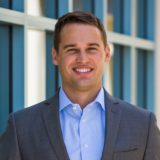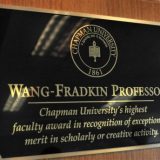It Takes A Village To Educate Our Students Pancreatic cancer survivors help our students learn the art of science communication.
February 6, 2020
Many students in the sciences are working towards a career in healthcare. Which poses the question: How do we, as a college, prepare our students to be leaders in the healthcare industry?

Dr. Girgis talking with students in the Cancer Biology Course about his research.
Going Beyond a Textbook
Our faculty are preparing our young scientists for real-world challenges by further developing their interpersonal communication skills. Schmid College is committed to teaching our students to communicate science to non-scientists but, most importantly, teaching them to address their audience with understanding and compassion.
Associate Professor of Biology and Co-Director of the Institute for Excellence in Teaching and Learning (IETL) Dr. Melissa Rowland-Goldsmith whole-heartedly believes in the proverb, “it takes a village.” In that spirit, she rallied a network of faculty, alumni, pancreatic cancer survivors, and caregivers to help her students develop their science communication skills.
The Art of Science Communication
As part of the Cancer Biology course taught by Dr. Rowland-Goldsmith and her co-instructor Dr. Marco Bisoffi, students give a final presentation on a figure from one of three co-authored papers by Dr. Mark Girgis, who is a pancreatic cancer surgeon and researcher at UCLA. Back in October, the students met with Dr. Girgis where he gave the students an overview of all three of his papers, as well as shared with the students what it’s like to be a surgeon and researcher.
To help prepare for their presentations, the students take an 8-week course called the Art of Science Communication. This course was created through the American Society for Biochemistry and Molecular Biology (ASBMB). Dr. Rowland-Goldsmith was certified to host the class through the organization and began teaching it last year. Now in its second year, she has recruited three alumni who took the course last year and were certified to be co-instructors. Emily Cauble ’19, Linda Freedkin ’19, and Heidi Standke ’20 each taught a cohort of three students this past fall.
“The most important lesson that I have learned by being a student, then an instructor of the course, is that science isn’t just for scientists; it is for anyone and everyone.” – Emily Cauble ’19

Lindsay Zumwalt ’20 giving her final presentation
It Takes a Village
Dr. Rowland-Goldsmith invites local pancreatic cancer survivors and caregivers to visit the class to share their experiences and help grade the students’ final presentations, bringing a human element to an otherwise molecular biology focused course. Dr. Rowland-Goldsmith is connected to this group through the Pancreatic Cancer Action Network (PanCAN). She initially became involved with the organization when she was a post-doc in a pancreatic cancer research lab. “I was starting to get disconnected from the human component of what I was doing with my research. Going to my first PanCAN walk was inspiring. I met so many fighters, survivors, and caregivers. Some I am still friends with today. It helped drive my research,” explained Dr. Rowland-Goldsmith.
A truly memorable course, Emily Cauble ’19 shares, “the ability to communicate complex ideas to people who are not familiar with the field is a beautiful gift that I will take with me throughout my future career paths and in life.”

Pancreatic cancer survivors and caregivers with the students at the final class of the semester.


